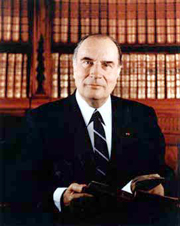
flowered-garden-normandy-32.jpg
About France Category: History
- Profile
François Mitterrand (October 26, 1916 – January 8, 1996) was a French politician and President of France from May 1981, re-elected in 1988, until 1995.François Mitterand President of France
Mitterrand was born in Jarnac, Charente. In his youth he was a staunch conservative and an ardent Catholic. His first political act was to join the ultranationalist
Croix de Feu, which he did in preference to the larger but equally conservative Action Francaise due to the proscription of the later organisation by the Vatican.
Enrolled during WWII, he was made prisoner in 1940 and escaped in 1941. He reached the so-called free zone and joined the Vichy government as a junior minister, although later on he worked with the French Resistance while still holding on to his ministerial job. Almost until his death, Mitterrand would lay a wreath every year on the grave of Pétain, the head of the Vichy governement and a French hero of the first World War; in 1943 he is said to have received the francisque, the honorific distinction of the Vichy regime, which he later denied.
After the war he quickly moved back into politics, and was elected as representative for the Nièvre département in 1946. He held various offices in the Fourth Republic before resigning in 1957 over the French policy for Algiers. In 1959, on the avenue de l’Observatoire in Paris, Mitterrand escaped an assassin’s bullet by diving behind a hedge. The incident brought him a great deal publicity, boosting his political ambitions. Some of his critics claim that he had staged the incident himself. Prosecution was initiated on the issue, but was later dropped.
In the Fifth Republic he stood in the Presidential elections against Charles de Gaulle in 1965 but was defeated. He turned to the French Socialist Party (PS), becoming leader of the party by 1971, following the Congress of Epinay. He stood again in 1974 opposite Valéry Giscard d’Estaing and was again defeated. But in 1981 he became the first socialist President of the Fifth Republic. One of his first decisions was to abolish the death penalty.
Domestically his aims were blunted first by a conservative parliament and then by a series of financial crises, although he worked well with the Prime Minister Jacques Chirac. His major achievements came internationally, especially in the European Economic Community.
He supported the extension of the Community to Spain and Portugal (who both joined in January 1986) and in February 1986 he helped the Acte Unique come into effect. He worked well with Helmut Kohl and improved Franco-German relations measurably. Together they fathered the Maastricht Treaty, which was signed on February 7, 1992.
His term as President ended in May 1995. He was succeeded by Jacques Chirac and died of cancer six months later. Following his death, a controversy erupted when his former physician, Dr Claude Gubler, wrote a book called Le Grand Secret (“The Great Secret”) explaining that Mitterrand had had false health reports published since November 1981 about his cancer.
His wife, Danielle Mitterrand, is a left-wing militant. In addition to his sons Jean-Christophe and Gilbert Mitterrand, he had an illegitimate daughter, Mazarine Pingeot. His nephew Frédéric Mitterrand is a journalist.
- Photos

 Croix de Feu, which he did in preference to the larger but equally conservative Action Francaise due to the proscription of the later organisation by the Vatican.
Croix de Feu, which he did in preference to the larger but equally conservative Action Francaise due to the proscription of the later organisation by the Vatican.